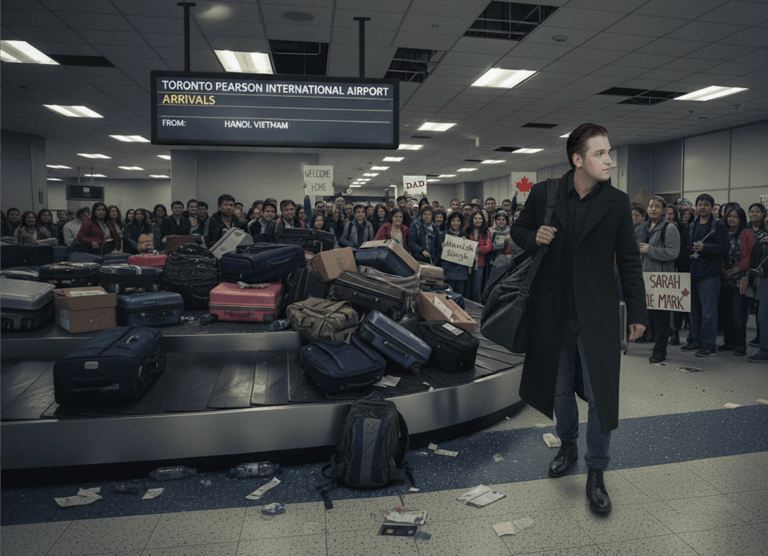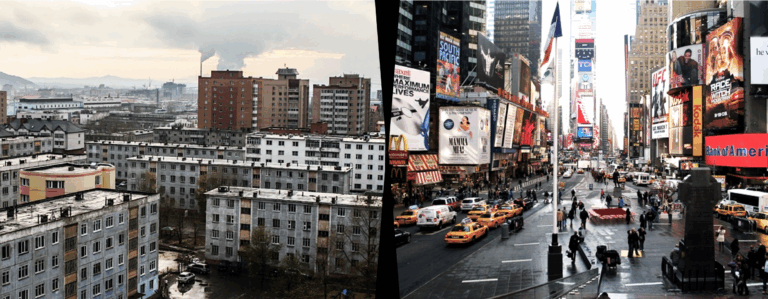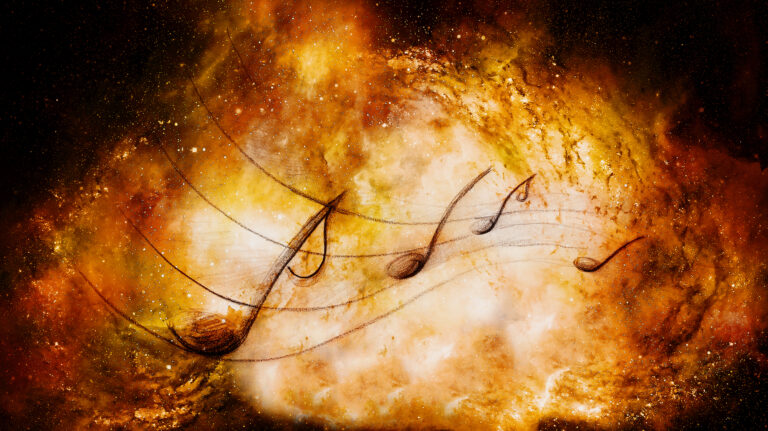I’m sitting on a bench on the river boardwalk that skirts our quayside building, resting for a few minutes, sipping a coffee and taking my leisure after a pleasant saunter. I recall Henry David Thoreau’s glorious passages in his essay Walking in which he stressed the importance of “sauntering,” described as “the enterprise and adventure of the day.” The word “saunter,” he points out, derives from people “who roved about the country, in the Middle Ages, and asked charity, under pretense of going à la Sainte Terre, to the Holy Land, till the children exclaimed, ‘There goes a Sainte-Terrer,’” in other words, a saunterer, a seeker capable of “sympathy with Intelligence.”

Idly watching people walk by, I can’t help noticing the ubiquity of the cell phone, the constant companion of pedestrians everywhere. Just for the fun of it, I begin keeping score. Several individuals amble past, consulting their phones held like a wand or talisman in a raised arm. Then a couple, each with that obligatory device into which they stare with rapt attention, completely oblivious to one another. Next, a girl walking her dog, leash in one hand, smartphone in the other, followed by a young man, ditto. Then, a young mother pushing a pram while intently reading the screen. Someone else walks by talking into plastic. A number of people are taking selfies. Almost miraculously, nobody stumbles or walks into a lamp post. Clearly, though, one cannot saunter while wielding a mobile.
Meanwhile, the scene around is alive with beauty and interest: flaming dogwood and Japanese cherry shedding their pink light into the air; plump koi speckled gold and cream gliding lazily in the ornamental pools and water gardens dotting the leafy esplanade; on the river, a tug hauling an immense freighter toward the docks and another towing a Seaspan chip barge to the sawmill, a loon preparing to dive and a seal or otter lifting its head from the waves. The tallest tin soldier in the world guards the entrance to the River Market, which seems to interest only children too young for smartphones. The largest sea gulls I have ever seen, some white, some gray, strut on a narrow sandbar. My friend Howard the Heron is busy deciding which of the logging bollards and pilings to perch on, his flight an act of pure grace.
So much to look at! A passage from Walt Whitman’s Crossing Brooklyn Ferry comes to mind:
The sea-gulls oscillating their bodies, the hay-boat in the twilight…
The scallop-edged waves in the twilight, the ladled cups, the frolicsome crests
and glistening…
the gray walls of the granite storehouses by the docks…
the big steam-tug closely flank’d on each side by the barges…
But it is as if none of this exists – the extraordinary richness of ordinary experience drifting by unremarked. There is also the inner world of one’s thoughts, memories and observations, which had always seemed to me more than sufficient to occupy one’s waking moments. Communing with oneself, one might learn that one is both an excellent conversationalist and a good listener, a dispenser of ageless wisdom and a gold-medal student. OK, kidding, but an inner landscape obliterated by the omnipresent cell phone is a melancholy thing to contemplate.

I recall some years back sharing a ride with a twenty-something girl in a car-dealership van on the way to pick up our newly inspected vehicles. She made no conversation with the driver or me, too absorbed in her screen, stroking it tenderly like a lover’s cheek. Finally, I asked her, no doubt intrusively, why she paid so much attention to her device. “Because I’m bored,” she replied.
I was struck by her answer. After all, boredom has its upside. It can lead to a renewed appreciation of the sparkle of the world around one. It can force one to plumb one’s inner resources. It can toughen one’s resolve to see things through. It may provoke one to read a book. It’s an anagram for bedroom. As Søren Kierkegaard put it in Either/Or, “Those who bore others are the plebeians, the crowd, the endless train of humanity in general; those who bore themselves are the chosen ones, the nobility,” since they are the ones who are able to “entertain others.” Boredom, said Adam Phillips in On Kissing, Tickling and Being Bored, “is akin to free-floating attention…Boredom is integral to the process of taking one’s time.” And, as French critic and semiotician Roland Barthes observed in a delightful collection of essays, Mythologies, “Boredom is bliss viewed from the shores of pleasure.” Indeed, figuring out Barthes’ apothegm may also be a cure for boredom.

All these people I see walking by, eyes glued to the cell phone screen, trading trivialities with online friends, playing thumb-twiddling games, slavishly following directions from a machine instead of looking at signs and landmarks and learning the way for themselves, and surfing social media while the world is happening around them convince me that we are stumbling blindly into a new dark age. This is the future we are blithely welcoming. As James Bridle argues in New Dark Age: Technology and the End of the Future, “A kind of transport or transference [of information] is achieved, but at the same time a kind of disassociation, an offloading of…a way of thinking into a tool, where it no longer needs thinking to activate.”
Communing with oneself, one might learn that one is both an excellent conversationalist and a good listener, a dispenser of ageless wisdom and a gold-medal student. OK, kidding, but an inner landscape obliterated by the omnipresent cell phone is a melancholy thing to contemplate.
This is what Bridle calls a “chasm,” a gap or crevice “that opens up between us when we fail to acknowledge and articulate present conditions.” He believes the overall effect is more than merely trivial or annoying, but is bringing about “aspects of a new dark age that are real and immediate existential threats.” Bridle is no Luddite and champions the proper use of our digital technology. Doing so, however, “depends upon attention to the here and now” and upon arriving at a symbiotic relation with our machines – “the things we think and discover together.” He is concerned with avoiding “crashing ecosystems” and the like. His outlook remains positive, based on his belief that we “are not…without agency, and not limited by darkness.” He remains convinced we are able to control our technological accomplices.

But it is hard to deny that the ecosystem governing thought, meaning and interpersonal relations is disintegrating. Something has been manifestly lost in our all-encompassing digital age: the free exchange of reflective minds, the habit of meditation, lateral awareness of the real world, and the very contours of the introspective and stable self. Libraries are growing obsolete. “In the age of Google and the iPhone,” asks Michael Walsh in The Fiery Angel, “Do we even need a ‘library’?” We are swamped in a flood of information, most of it superficial and distracting, much of it false or misleading. We are constantly “connected” in a massive irony of disconnection from both self and other. A dystopian future we could once scarcely imagine may be coming to pass, a world no longer confined to fiction.
The mobile phone, for all its uses and convenience, is the bane of wakeful existence. Italian detective story writer Andrea Camilleri has a striking passage in The Safety Net, in which his protagonist, Chief Inspector Salvo Montalbano, approaches a group of teenagers absorbed in their cell phones, locked in “their personal bubbles of isolation.” Gazing at their faces, he sees that “all of them had pinpoint pupils and looked lost” and that none raised their heads to acknowledge him, “as would have been natural.” He walks away, wondering how it was possible, “in the age of global communication, where all cultural, linguistic, geographical, and economic borders had been erased from the face of the earth, that this vast new realm had only created a multitude of loners, infinite numbers of lonely people in communication with one another, yes, but still in a state of utter solitude.”


The cell phone, of course, is both an object and a symbol—a symbol of a far-flung network, as Bridle says, of “computational prediction, surveillance, ideology and representation [that] inform[s] and shape[s] our present perceptions of reality.” And that is the issue. For it is, in effect, precisely what it says, a “cell,” in which we lock ourselves and throw away the key. The “phone” part is beside the point, and not only because hardly anyone under 40 even uses their devices to talk to others (except perhaps grandparents), but since we cannot take advantage of the one permitted call to a lawyer to arrange for our release – there is no lawyer in the cell phone world.
If the soul is free, poet Richard Lovelace affirmed, “minds innocent and quiet” may experience a “Hermitage” consecrated to the enjoyment of liberty. The same cannot be said for Gorilla Glass and the latest OLED display, which is not a hermitage but a confinement whose parameters appear to be absolute.
“Stone walls do not a prison make,” wrote poet Richard Lovelace in 1642, “Nor iron bars a cage.” If the soul is free, he affirmed, “minds innocent and quiet” may experience a “Hermitage” consecrated to the enjoyment of liberty. The same cannot be said for Gorilla Glass and the latest OLED display, which is not a hermitage but a confinement whose parameters appear to be absolute.
George Steiner may have been right when he imagined a future of small, monastic flares of intellectual light sprinkled across a desolate landscape, reviving Max Weber’s notion of frail enclaves of enlightenment as the last resort of a civilization sinking into darkness. I think, too, of Walter M. Miller Jr.’s classic A Canticle for Leibowitz with its obscure abbey in the Utah desert where historical knowledge is kept alive in a blighted world, even if it’s only a sacred shopping list. The problem, as Barry Lopez says in Arctic Dreams, is that “The good minds still do not find each other often enough.” Certainly not, especially if they, too, are wired to their cell phones.

Perhaps among the crowd of strollers I observe from my bench on the boardwalk, Brother Blacktooth, whom we first meet in Miller’s sequel Saint Leibowitz and the Wild Horse Woman, bearing a staff instead of a mobile phone, has embarked on an immense journey, a prolonged and adventurous saunter into the future and toward the distant light. The monk represents a ray of attenuated hope for the survival of intellect, discernment, thoughtfulness and what we used to call “spirit.” But such a possibility is by no means clear. “A new world was rising,” he notes, “but it could not grow as fast as the old.” The new world he refers to is not the high-tech, solipsistic world we see around us but the world of a reconnected humanity pursuing its adventure of exploration and discovery. But Brother Blacktooth is right. It is not growing very fast.
David Solway’s latest book is Notes from a Derelict Culture, Black House Publishing, 2019, London. A CD of his original songs, Partial to Cain, appeared in 2019.






